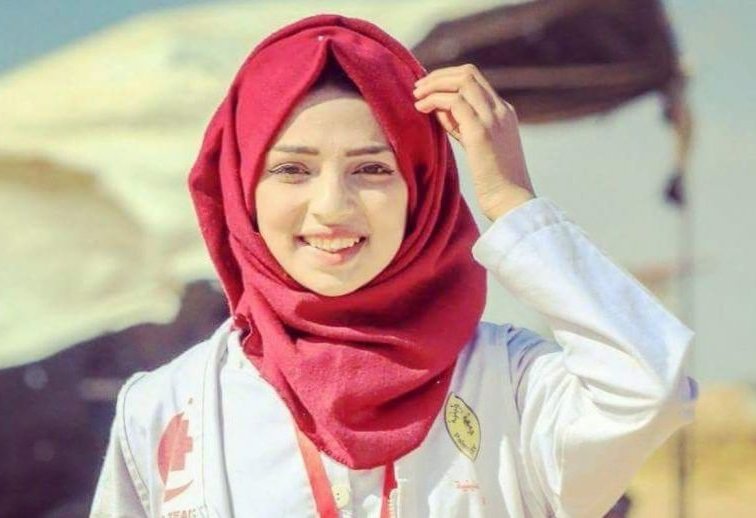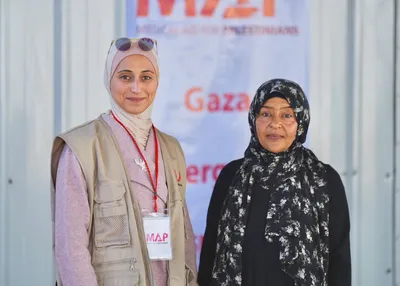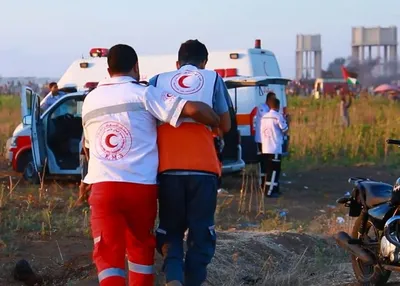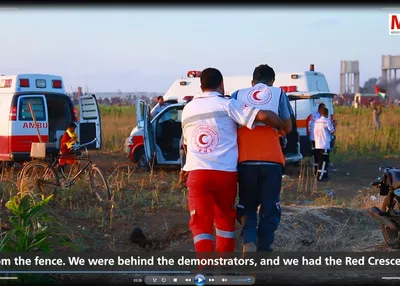Killing of Gaza paramedic Razan al-Najjar underlines need for accountability

Razan was fatally shot in the chest by Israeli forces while trying, with other first responders, to reach injured demonstrators close to Israel’s perimeter fence in Khuza'a in the south of Gaza. Witnesses said Razan approached the fence wearing a white medic's vest with both of her arms raised to show Israeli forces about 100 meters away that she posed no threat.
Rida Najjar, also a medical volunteer, was standing next to Razan when she was shot. "As we entered the fence to retrieve the protesters, the Israelis shot tear gas at us," she told Al Jazeera. "Then a sniper fired a single shot, which hit Razan directly. The fragments of the bullet wounded three other members of our team.
"Razan at first didn’t realise she had been shot, but then she started crying out, 'My back, my back!' and then she fell on the ground. It was very clear from our uniforms, our vests and medical bags, who we are. There were no other protesters around, it was just us”.
A month before her death, Razan told the New York Times: "We have one goal - to save lives and evacuate [wounded] people. We do this for our country," adding that it was humanitarian work.
On Saturday, thousands attended Razan’s funeral in Khuza'a.
Attacks on Palestinian healthcare
Razan is the second paramedic in Gaza to be killed by Israeli forces since the “Great March of Return” demonstrations began on 30 March. On 14 May paramedic Musa Abuhassanin was fatally shot in the chest by Israeli forces. UN OCHA has reported that from 30 March to 27 May, at least 245 health personnel were injured and 40 ambulances damaged by Israeli forces. Many of these were hit by live ammunition.
These latest attacks come soon after the release of the latest annual report from the Safeguarding Health in Conflict Coalition – of which MAP is a member – which identified 93 attacks on healthcare in the occupied Palestinian territory (oPt) in 2017, including violence against Palestinian health workers, interferences with the delivery of health care, obstruction of medical transport, and armed raids on medical facilities in Ramallah, Hebron and East Jerusalem.
Attacks on Palestinian health workers, facilities and ambulances by Israeli forces have been a painfully regular feature of the past decade. In 2015, alongside the Al Mezan Center for Human Rights and Lawyers for Palestinian Human Rights (LPHR), MAP called for an end of impunity for such attacks following the damaging or destruction of 17 hospitals, 45 ambulances and 56 clinics during Israel’s 2014 military offensive in Gaza. In three Gaza offensives over the past 10 years (2008/9, 2012 and 2014), 38 medical workers were killed on duty and a further 106 injured. No perpetrator has been held to account for any of these attacks.
Attacks on medical teams in Gaza not only risk the life and health of staff and patients, but also undermine the overall capacity of Gaza’s health system, already struggling under a decade of blockade and closure, with longstanding shortages of medical supplies, electricity and fuel.
The protection of medical safe spaces in times of conflict is enshrined in international humanitarian law. A failure to ensure credible investigation, accountability, or redress for attacks on healthcare in the occupied Palestinian territory (oPt) makes recurrence more likely. As an open letter by LPHR to the UK government indicates, the killing of Razan occurred in a context of impunity and further such violations and suffering are likely.
Israel’s preliminary internal military investigation into the killing of Razan found that Israeli forces did not fire directly at her. However, such internal Israeli investigations fall short of required standards. The UN High Commissioner for Human Rights Zeid Ra'ad Al Hussein has highlighted a “deficit in accountability for alleged extrajudicial killings and other violations, as previously reported by the Secretary General and my Office, undermines confidence in Israeli justice.” Despite this the UK Government abstained on a UN Human Rights Council vote establishing a Commission of Inquiry into recent violent events in Gaza.
MAP is calling on the UK Government to reiterate its commitment to the respect for and protection of medical personnel and facilities as enshrined in international law, including UN Security Council Resolution 2286. The UK must furthermore support international efforts to promote impartial investigations of - and accountability for - violations of international law in the oPt.
You can read more about this issue in Chapter 2 of our Health Under Occupation report.
Image credit: World Health Organization:(http://www.emro.who.int/images/stories/palestine/documents/WHO-Health-Cluster-Special-SitRep-4-June_final.pdf?ua=1)
Related content


